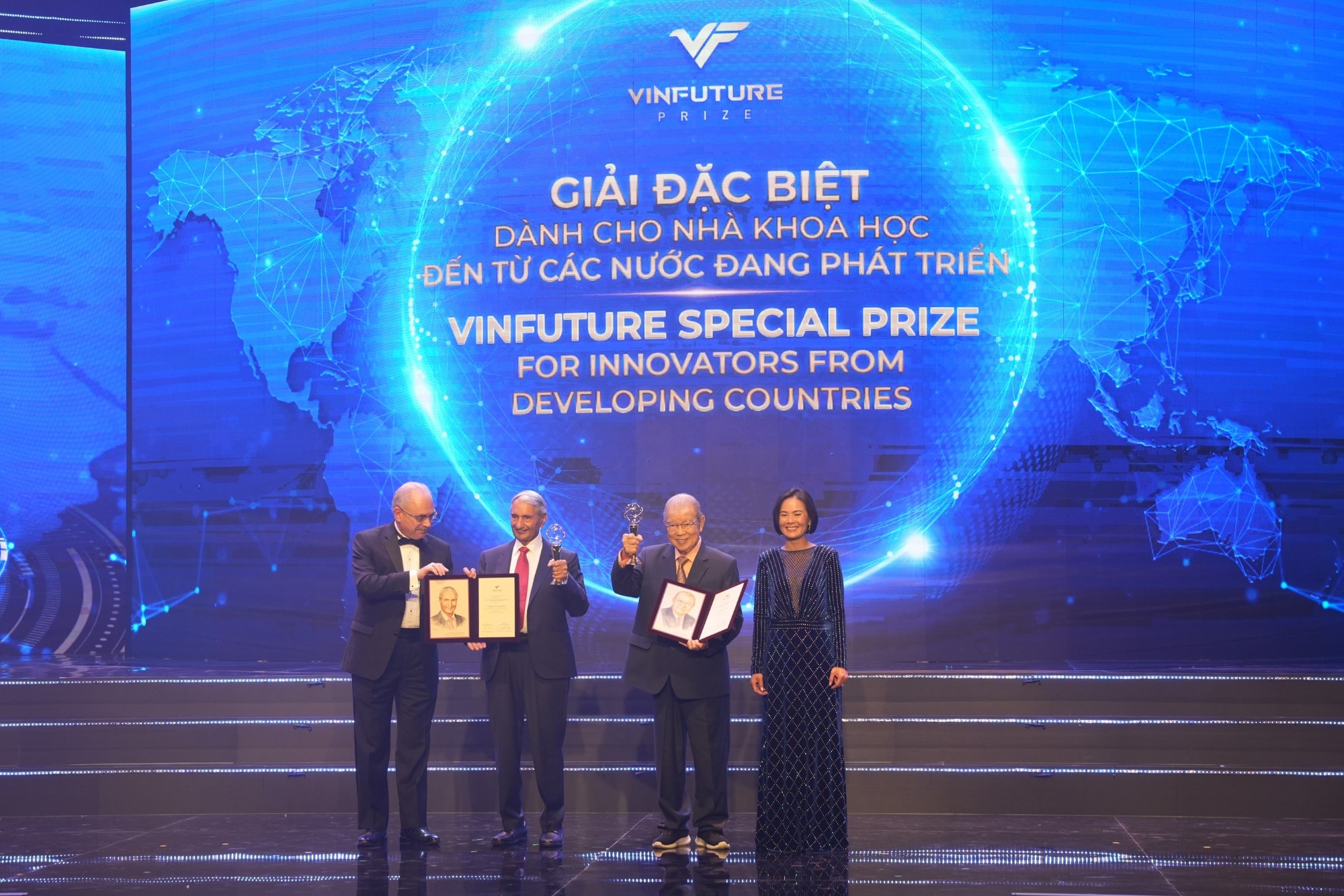Professors Gurdev Singh Khush and Vo Tong Xuan among 2023 VinFuture Prize Laureates

(Photo source: VinFuture)
HANOI, VIETNAM - December 12, 2023 - The 2023 VinFuture Special Prize for Innovators from Developing Countries has honored Indian American Professor Gurdev Singh Khush and Vietnamese Professor Vo Tong Xuan for their significant contributions to the invention and advancement of disease-resistant rice varieties, ensuring global food security.
Led by The VinFuture Foundation, the annual VinFuture Prize is awarded to proven breakthrough scientific research and technological innovations which have high potential to create meaningful change in people’s lives through tangible and highly scalable improvements in areas such as productivity, prosperity, connectivity, health, safety, environment, and sustainability. The VinFuture Prize consists of four prestigious awards presented each year. The most esteemed is the VinFuture Grand Prize, valued at US$3 million, making it one of the largest annual prizes globally. The 2023 VinFuture Prize’s nominations come from respected scientists and organizations from 90 countries and territories across six continents.
Professor Khush was recognized for his pioneering research and development of many groundbreaking rice varieties, such as IR8, IR36, and IR64 which are resistant to numerous pests and diseases and yield quality grains. The development of high-yielding rice varieties has revolutionized rice cultivation worldwide, enabling substantial increases in production while reducing costs and minimizing the reliance on harmful chemicals.

Among these innovations, IR64, a variety developed by Professor Khush and researchers at the International Rice Research Institute (IRRI), stands out as a remarkable achievement. Its unique combination of intermediate amylose content, soft gel consistency, intermediate gelatinization temperature, translucency, and long slender grains has made it a highly sought-after variety, cultivated in almost all rice-producing countries. Beyond its standalone success, IR64 has also served as a parent strain for thousands of hybrid varieties, demonstrating its versatility and enduring impact on global food security.

By the 1980s, the IR36 rice variety was globally adopted, cultivated on up to 11 million hectares. By 2000, the widespread dissemination of IR36 and other rice varieties significantly boosted rice yields with production increasing by 600 million tons. Besides IR36, IR64 was also widely cultivated in over 10 million hectares within two decades of its release, making a positive impact on millions of lives worldwide. IR64 was first released in the Philippines in 1985, soon followed by releases in Bhutan, Burkina Faso, Cambodia, China, Ecuador, The Gambia, India, Indonesia, Mauritania, Mozambique, Vietnam, and the Sahelian regions of West Africa. By 2018, IR64 and its successive generations were extensively grown in many countries and became the most popular rice varieties in the Asian tropical regions, which exemplified their superior characteristics and exceptional adaptability.
Through the significant efforts of Professor Vo Tong Xuan, IR36 and IR64 rice varieties are currently the most common in tropical Asia, helping to cut production costs, enhance yield, restrict pesticide use, and promote global agricultural sustainability. His work played a significant role in popularizing IR36 in pest-infected areas in the Mekong Delta region and allowing farmers to apply advanced grafting techniques. He has helped Vietnamese farmers increase their access to high-quality rice varieties, thus spurring higher rice yields and reducing costs. The former IRRI research fellow and trustee is the first Vietnamese scientist honored with the VinFuture Prize.
Professor Gurdev Singh Khush, also an esteemed IRRI alumnus, has been dubbed as the world’s most prolific rice breeder. He led the rice breeding program of IRRI for 35 years (1967-2002). He retired in February 2002 as Principal Plant Breeder and Head of Division of Plant Breeding Genetics and Biochemistry. During his illustrious career at IRRI, he spearheaded the program for developing high yielding and disease and insect resistant varieties of rice which ushered in the Green Revolution in rice farming. More than 300 rice varieties developed under his leadership have been released in Asia, Africa and Latin America.
Read more on the VinFuture Prize here.